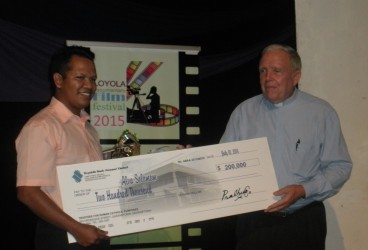Judges at the second Loyola Documentary Film Festival (LDFF) on Friday complimented filmmakers on their concepts, but felt the films they produced lacked technical proficiency.
Seven films competed in the LDFF, which was organized by CatholicTV Guyana. Four of the seven films were entered in the amateur category and the other three in the professional category. The judges were Kojo McPherson, Margaret Lawrence and Andrew Kendall.

Alva Solomon took the top prize in the amateur category, winning $200,000, with his film Plantain Nation, while Rustom Seegopaul won in the professional category with Recycling: From Trash to Treasure.
Plantain Nation tackled a disease in the plantain industry. The film focused on the diversification of Guyana’s agriculture industry and the Guyanese relationship with plantains. It spoke of how plantains could be good for export but that the disease was a major issue for producers. The judges said the film was well researched but they felt the focus on the disease was overdone. They felt too that the film could have been more focused and cohesive. Plantain Nation was commended for its editing, use of local and natural sounds and great use of locations.
Seegopaul’s Recycling: From Trash to Treasure, was described as a good effort.
It was said to have interesting compositions and was well scripted. Nevertheless, the judges felt Seegopaul’s entry was a notch down from his entry last year.
Rashan Reid and Aneka Edwards’s Crossing the Boundaries earned them second place in the amateur category and a $100,000 prize. Crossing the Boundaries, a documentary on interracial marriage, started by comparing the statistics garnered from 1994 to 2015, which showed an upsurge in interracial marriages.
The film’s dialogue was fresh and realistic. The tones of the people who were interviewed were filled with love and contentment, despite them having to deal with the constant stares of society. The couples who were interviewed would have been together for at least 9 years. They spoke poignantly about interracial unions and the beauty of cultural mixing. The film suggested to the audience that love had transcended societal pressures and at times the audience roared with laughter at the couples’ frankness about their union.

The judges said the story was told in a compelling and entertaining manner and the topic was relevant to our society. They said it was well researched and had an impressive variety of interviewees. However, the film was criticised for its shot composition and the editing was called uneven. The judges felt the script saved the story from its technical issues.
Lisa Edwards’s Her Voice and Francis Quamina Farrier’s Saint Ignatius: The Man and The Mission tied for second place in the professional category.
Her Voice tackled a woman’s role in Guyana’s society and Saint Ignatius was a trip through history and the culture of St Ignatius Village in the Rupununi. Both films were criticised for technical problems and unfocused storytelling. The judges did compliment the filmmakers for researching their topic of interest and the effort that was put in.
The other entries were Epiphany, which was disqualified, and Rude Awakening, both in the amateur category.
Epiphany, which was directed by Collette Jones-Chin, was not a documentary, but a mockumentary. Nevertheless, the judges felt the film was inventive and applauded the filmmaker for being creative. They said there is room for mockumentary filmmaking in Guyana and hope it can be explored.
The film portrays an old woman who has been living in despair because of the many tragedies that afflicted Guyana. She goes back in time and explores the harsh reality of Guyana’s past.
The woman expresses hope that the young men and women in the country will move Guyana forward and acknowledges that she might be dead when this happens but is still optimistic about the youths of today.
Rude Awakening dealt with noise pollution, but was not shown because the producers failed to meet the standard requirements. The judges called it a brave attempt and encouraged the filmmakers to keep trying.





